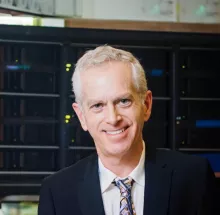
Examining Earth's Fast Radiative Feedbacks Using Machine-Learning-Based Emulators of the Climate System
This plenary session is part of the Artificial Intelligence and Digital Twins for Earth Systems workshop co-hosted by USACM and the Oden Institute for Computational Engineering and Sciences at UT Austin.
Abstract: The response of the climate system to increased greenhouse gases and other radiative perturbations is governed by a combination of fast and slow feedbacks. Slow feedbacks are typically activated in response to changes in ocean temperatures on decadal timescales and often manifest as changes in climatic state with no recent historical analogue. On the other hand, fast feedbacks can be activated in response to rapid atmospheric physical processes on timescales of weeks and are already operative in the present-day climate. This distinction implies that the physics of fast radiative feedbacks is present in the historical reanalyses that have served as the training data for many of the most successful recent machine-learning-based emulators of weather and climate. In addition, these feedbacks are functional under the historical boundary conditions pertaining to the top-of-atmosphere radiative balance and sea-surface temperatures. We discuss our work using historically trained weather emulators to characterize and quantify fast radiative feedbacks without the need to retrain for conditions pertinent to a future warmer climate.
Speaker Bio: Dr. William Collins is an internationally recognized expert in climate modeling and climate change science. He is the Associate Laboratory Director of the Earth and Environmental Sciences Area (EESA) at Lawrence Berkeley National Laboratory (LBNL) and was the director of the Climate and Ecosystem Sciences Division (CESD) from 2015 to 2022. Collins is also a Professor in Residence in the Department of Earth and Planetary Science at the University of California.
Dr. Collins is a Fellow of the American Association for the Advancement of Science (AAAS), the American Physical Society (APS), the American Geophysical Union (AGU), and the American Meteorological Society (AMS). Dr. Collins was awarded the DOE Secretarial Honor Award for launching DOE’s Accelerated Climate Model for Energy in 2015.
Before joining UC Berkeley and Berkeley Lab, Dr. Collins was a Senior Scientist and Chair of the Scientific Steering Committee for the DOE/NSF Community Climate System Model project at the National Center for Atmospheric Research (NCAR).
Dr. Collins was a Lead and Coordinating Lead Author of the Sixth Assessment Report of the Intergovernmental Panel on Climate Change (IPCC), a Lead Author of the Fifth IPCC Assessment, and a Lead and Collaborating Author of the Fourth IPCC Assessment, for which the IPCC was awarded the 2007 Nobel Peace Prize.